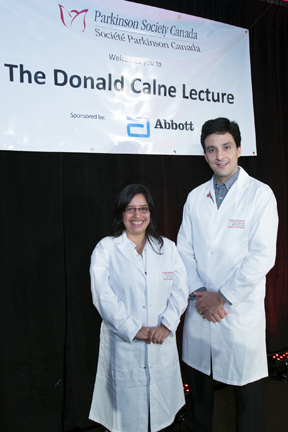
L-R: Post-doctoral fellows Marjorie Gonzales and Andre Felicio, who received research awards from Parkinson Society Canada.
Parkinson Society Canada has awarded research grants to two faculty members and two post-doctoral fellows in the Faculty of Medicine:
- Doris Doudet, Professor in the Division of Neurology, received $45,000 to develop a radioactive tracer to allow imaging scans of the brain. Imaging will help pinpoint changes in the system in the brain that produces noradrenaline, an important chemical implicated early in Parkinson’s disease.
- Dr. Thibault Mayor, Assistant Professor in the Department of Biochemistry and Molecular Biology, received $45,000 to investigate a protein called UCHL1, to see if it can prevent cell death by triggering one of the two recycling systems within cells to clear out damaged proteins if the other system fails.
- Andre Felicio, a post-doctoral fellow in the Pacific Parkinson’s Research Centre, received $25,000 to investigate whether the chemical serotonin plays a role in dyskinesia, the uncontrolled movements that can be a side-effect of dopamine-replacement therapy. Learning more about serotonin’s involvement in dyskinesia could lead to more effective treatments.
- Marjorie Gonzalez, a post-doctoral fellow in the Medical Physics program of the Department of Physics and Astronomy (Faculty of Science) will receive $80,000 over two years to use MRI and PET to learn why compulsive behaviours occur in up to 15 per cent of Parkinson’s patients. Her research could lead to better therapies for motor symptoms of Parkinson’s that don’t cause these challenging side effects.
A special presentation of the awards took place Oct. 18, at an event that included the Donald Calne Lecture, presented this year by Matthew Farrer, the Canada Excellence Research Chair in Neurogenetics and Translational Neuroscience and the Dr. Donald Rix B.C. Leadership Chair in Genetic Medicine at UBC. His talk was entitled, “Parkinson’s Progress: From Molecular Genetics to Medications.”